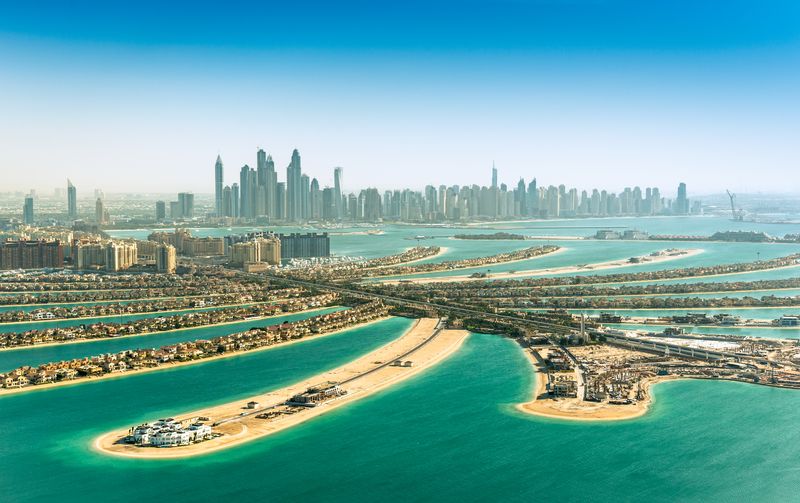Blockchain
How the UAE is Empowering its Citizens through Blockchain
November 1, 2018 | Written by: Amr Refaat
Categorized: Blockchain
Share this post:

The Palm Jumeirah, Dubai, UAE.
Blockchain is proving to be a disruptive technology. Over the last few years, countries, governments and organizations started experimenting with blockchain, and are now adopting this transformational technology. The United Arab Emirates has been tapping into the potential of blockchain to revolutionize its government processes and citizen services.
Dubai’s journey with blockchain dates back to February 2016, when the government announced the launch of the Global Blockchain Council, which consists of a wide range of members, including government entities, financial institutions and leading technology companies such as IBM.
Fast forward a few months later, in October 2016, H.H. Sheikh Hamdan bin Mohammed bin Rashid Al Maktoum, Dubai Crown Prince and Chairman of the Board of Trustees of Dubai Future Foundation, reinforced Dubai’s position as a global leader in transforming digital enterprise when he announced Dubai’s Blockchain Strategy, with a vision to create paperless by 2021.
Soon after the announcement, Smart Dubai Office (SDO) launched a city-wide initiative to develop blockchain services for Dubai and appointed IBM as the Blockchain Lead Strategic Partner. Ever since, the city witnessed a drumbeat of blockchain powered innovations, coupled with collaborations amongst organizations and governments entities.
Today, IBM is already enabling numerous organizations and governments in Dubai to build blockchain-enabled networks across complex use cases. For example, the Department of Economic Development (DED) adopted IBM Blockchain to digitize the process of issuing business licenses and exchanging commerce information between government entities, free zones and the private sector ecosystem. We have also seen Dubai Airport Freezone Authority (DAFZA) engage IBM to transform and automate the free zone commercial licensing and renewal process using IBM Blockchain.
To further deliver on Dubai’s strategy, the city today is witnessing another milestone in its blockchain journey, with IBM and Smart Dubai at the forefront. Dubai is a city of firsts, and we have just announced the launch of the first government-endorsed blockchain service in the Middle East. This new service serves as a stepping stone for organizations in the UAE to move from blockchain development and testing to full scale implementation and is set to transform and fully digitize government processes and citizen services.
Coming full circle, blockchain is here and it’s happening today. In the Middle East, IBM is making important strides in the blockchain space and helping re-define the way people go about their day to day lives by integrating blockchain in citizen and government services, such as those of DED and DAFZA.
_______________________________________
This story first appeared on the IBM Blockchain blog.

General Manager, IBM Middle East and Pakistan
Making the workplace safe for employees living with HIV
The recent promising news about Covid-19 vaccines is in sharp contrast to the absence of a vaccine for HIV, despite decades of research. Unlike Covid-19 with a single viral isolate that shows minimal diversity, HIV circulates in a wide range of strains that so far have proven impervious to a single vaccine. Fortunately, more people […]
Call for Code for Racial Justice Needs You: Join the Movement
IBM has never avoided taking on big challenges. At IBM, we are privileged to drive impact at scale. We take on challenges that transform our clients, impact people’s lives and innovate for future generations as we strive to effect systematic societal change. Over the course of our 109-year history, the evidence has become clear that […]
A New Wave: Transforming Our Understanding of Ocean Health
Humans have been plying the seas throughout history. But it wasn’t until the late 19th century that we began to truly study the ocean itself. An expedition in 1872 to 1876, by the Challenger, a converted Royal Navy gunship, traveled nearly 70,000 nautical miles and catalogued over 4,000 previously unknown species, building the foundations for modern […]


